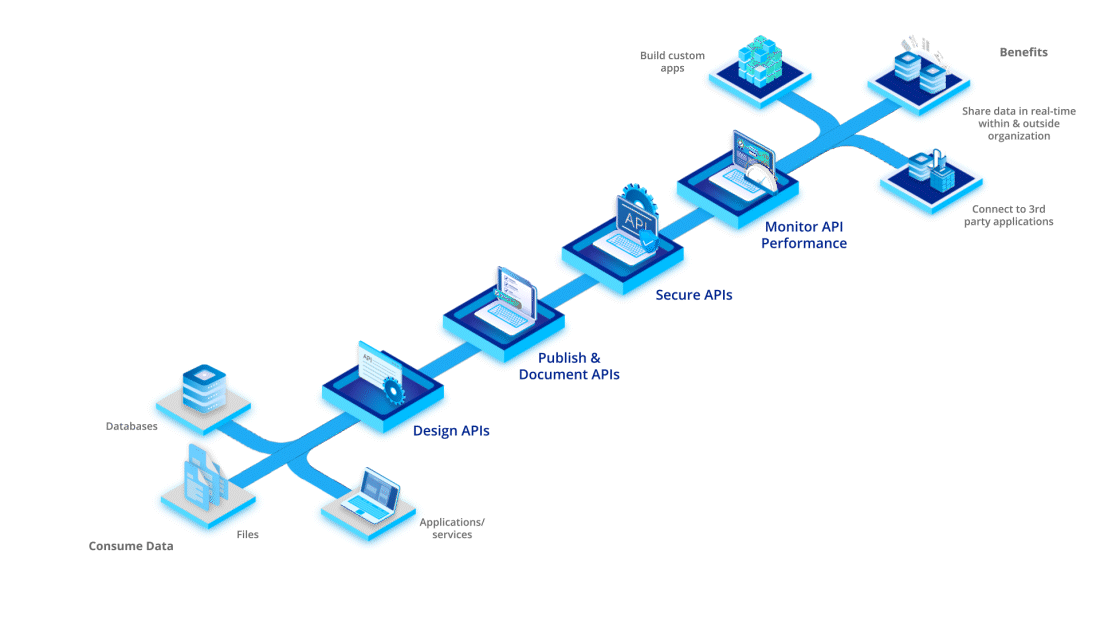The reliance on APIs is increasing for businesses striving to stay digitally competitive. However, creating and managing APIs is not a simple task.
As your business evolves, the demand for scalable, secure, and well-documented APIs intensifies, adding to the already high pressure on your development team. The consequences of ineffective API management are tangible—delays in project timelines, security vulnerabilities, and missed opportunities for innovation that can propel your business forward.
Enter API management tools.
This blog covers the top API management software in the market. It also provides guidelines to help you select the best API solution based on your use case.
First, let’s quickly cover the basics of API management tools and their benefits for data teams.
What is API Management?
API management is the systematic process of creating, overseeing, and securing APIs to ensure efficient and secure communication between different software applications. It involves a set of tools and practices that facilitate the development, deployment, and monitoring of APIs throughout their lifecycle.
API management encompasses tasks such as defining API specifications, handling authentication and authorization, managing traffic and usage, and monitoring API performance. Effective API management is crucial for businesses that seek to optimize data accessibility and interoperability.
What are API Management Tools?
API management tools help users design, create, test, monitor, and deploy APIs. They help data teams configure the entire API lifecycle within a single platform.
Some key functionalities of API management solutions include:
- API Design and Creation: API tools assist in designing API specifications, defining endpoints, and creating the necessary documentation for developers to understand how to interact with the API.
- Security and Authentication: API management tools provide mechanisms for securing APIs, implementing authentication, and controlling access through methods such as API keys, OAuth, or other authentication protocols.
- Traffic Management: These tools enable you to monitor and control the flow of data between APIs and applications, preventing overload or misuse, and ensuring optimal performance.
- Monitoring and Analytics: API management solutions offer real-time monitoring and analytics capabilities, allowing you to track API usage, identify performance bottlenecks, and gain insights into user behavior.
Benefits of Using API Management Tools
API Management tools greatly simplify API creation, deployment, and administration for businesses. They provide an array of benefits, such as secure data sharing, faster time-to-insight, and increased scalability.
Secure Data Sharing
APIs allow you to share critical enterprise data with internal and external partners, so maintaining security is one of the most important activities of any API management initiative. According to a Postman survey involving 37,000 developers and API professionals, 20% of respondents reported that API security incidents or breaches happen at least once every month at their organizations.
API management solutions help ensure that your APIs and data remain protected. An API management tool also gives insights into real-time API activity, which allows you to identify potential security vulnerabilities in networks, operating systems, and API components beforehand.
An Agile Approach to Development
API management enables you to design, test, publish, manage, and analyze all APIs in a single platform. Many API management solutions are fully automated, saving you time with manual tasks such as testing, deployment, or generating documentation.
Additionally, API management tools improve API usability so you can rapidly launch new initiatives to support changing business requirements.
Automation Equals to Time Saving
Developers spend a considerable amount of their time managing APIs. According to the 2022 Postman State of API Report, over 40% of developers spend more than 20 hours a week working with APIs — almost a third of which is spent creating APIs through coding and programming. The manual work can be an enormous burden on IT resources, especially when managing APIs on a large scale.
Automated API management solutions, such as Astera’s, accelerate API creation and publishing by automating most activities, like testing, error handling, pagination, etc.
Insight-Driven API Development
A crucial part of API management is API monitoring. A modern tool API tool comes with dashboards and logging mechanisms that give you an overview of key API metrics such as runtime statistics, API traffic, response times, and spikes. Additionally, it simplifies debugging by giving you detailed logs of processes and errors. You can use this data and insights to troubleshoot issues and plan for future API development.
Maintain API History with Versioning
As trends and requirements change, APIs need to evolve. An API management solution ensures that you can make changes to your APIs without disrupting the underlying system. API management tools also have governance features that make it easier to keep a tab on different versions of APIs.
Now that we’ve covered the benefits, let’s jump straight into the top future-proof API tools in the market.
The 10 Best API Management Tools for 2024
Astera
Astera API Management is the complete solution for full API lifecycle management. With its robust built-in functions and an intuitive code-free interface, Astera API Management makes building and managing APIs a breeze.
Here is how you can take control of the entire API lifecycle with Astera API Management:
- API Consumption: You can easily mash and consume APIs in Astera API Management. The API consumption component supports multiple authentication types, HTTP methods, and Open API metadata support.
- API Designer: The API Designer allows you to design and deploy API in minutes within a drag-and-drop interface. You can also test and validate results in real-time with Instant Preview and deploy APIs with one click. Leverage Astera’s wide array of pre-made components like connectors, transformations, data quality checks, and input/output settings to swiftly build and automate API Pipelines for applications dealing with large volumes of data.
- API Testing: You can test APIs at every stage of the process with the Instant Preview feature. You can also use the automatic documentation capability to export your API collection to an outside tool for testing.
- API Security: Astera API Management provides Oauth2 and bearer token authorization to ensure your API services are protected properly. You can define access roles. Authorization can be defined at any level of the endpoint hierarchy, up to and including the individual endpoint. Leverage Astera’s built-in security framework to ensure the protection of your API services and enable secure data sharing with stakeholders.
- API Publishing: APIs can be published as single endpoints or en masse for product deployment. With Astera API Management, you can publish your APIs in just a few clicks. All deployed APIs automatically generate Open API documentation which can be viewed in browser or exported as a collection to any API testing or consuming platform.
- API Monitoring: You can effortlessly visualize APIs and gain valuable business insights from your API data with the live dashboard in Astera API Management. Additionally, access a complete overview of your APIs via detailed API reports and logs.
Postman
Postman is another API development and management platform that provides a comprehensive set of tools for designing, building, testing, and deploying APIs. It offers a user-friendly graphical interface, support for various API formats, and a wide range of features that cater to both individual developers and enterprise teams.
Key API Management features of Postman are:
- Centralized API repository: Postman serves as a central hub for managing your API collection, documentation, tests, and other related artifacts. It allows you to organize your APIs into workspaces, making it easy to share and collaborate with team members.
- API design and documentation: Postman provides tools for designing and documenting your APIs in a structured and clear manner. You can use the built-in editor to create OpenAPI specifications (OAS), which define the structure and capabilities of your APIs.
- API testing and monitoring: Postman offers a powerful testing framework for validating the functionality and performance of your APIs. You can create automated tests using JavaScript or the Postman Sandbox, a mock API server that simulates responses to your API requests.
- API deployment and monitoring: Once your APIs are developed and tested, you can deploy them to a production environment using Postman’s deployment tools. Postman also provides monitoring capabilities to track API usage and performance metrics.
Apigee
Apigee is a comprehensive API management platform that offers a wide range of features for designing, building, deploying, and securing APIs. It is a cloud-based platform that is part of Google Cloud Platform (GCP).
Key features of Apigee include:
- A visual API design tool that allows you to easily create and configure API proxies. API proxies act as intermediaries between your backend services and API consumers, allowing you to add security, transformation, and other policies to your APIs.
- Automatically deploy your APIs to multiple environments, including production, staging, and development. It can also scale your APIs up or down automatically based on traffic demand.
- Multiple security features, including authentication, authorization, rate limiting, and data encryption. You can also use Apigee to protect your APIs from common web application attacks, such as SQL injection and cross-site scripting (XSS).
- Real-time analytics and monitoring for your APIs. You can track API usage, performance, and errors. You can also use Apigee to identify and troubleshoot API issues.
Mulesoft
MuleSoft is a software company that provides a platform for connecting applications, data, and devices. It is best known for its Anypoint Platform, a cloud-based integration platform.
Key API Management features of MuleSoft Anypoint Platform:
- A visual API design tool that allows you to easily create and configure API proxies.
- Ability to automatically deploy your APIs to multiple environments, including production, staging, and development. It can also scale your APIs up or down automatically based on traffic demand.
- A wide range of security features, including authentication, authorization, rate limiting, and data encryption. You can also use MuleSoft Anypoint Platform to protect your APIs from common web application attacks, such as SQL injection and cross-site scripting (XSS).
- A developer portal that allows you to provide a self-service portal for your API consumers.
- Governance features that allow you to control access to your APIs and enforce usage policies. You can define access control lists (ACLs), set usage quotas, and monitor API usage to ensure that your APIs are being used in a compliant manner.
SwaggerHub
SwaggerHub is a cloud-based API development and management platform that provides a comprehensive set of tools for managing APIs.
SwaggerHub provides:
- A central hub for managing your API collection, documentation, tests, and other related artifacts. It allows you to organize your APIs into workspaces, making it easy to share and collaborate with team members.
- Tools for designing and documenting your APIs in a structured and clear manner. You can use the built-in editor to create OpenAPI specifications (OAS).
- A powerful testing framework for validating the functionality and performance of your APIs. You can create automated tests using JavaScript or the SwaggerHub Explore tool, which allows you to interact with your APIs directly in the browser.
- Once your APIs are developed and tested, you can deploy them to a production environment using SwaggerHub’s deployment tools. SwaggerHub also provides monitoring capabilities to track API usage and performance metrics.
Apidog
Apidog is a free API development tool. It is a cloud-based platform that offers a user-friendly interface and a wide range of features that cater to both individual developers and enterprise teams.
Apidog streamlines the API lifecycle through:
- Options for designing and documenting your APIs in a structured and clear manner. You can use the built-in editor to create and maintain your API documentation, which can be exported to various formats, such as OpenAPI, Markdown, and HTML.
- A testing framework for validating the functionality and performance of your APIs. You can create automated tests using JavaScript or Python.
- API deployment and monitoring. Once your APIs are developed and tested, you can deploy them to a production environment using Apidog’s deployment tools. Apidog also provides monitoring capabilities to track API usage, performance, and errors.
- Streamlined collaboration and sharing among API developers and consumers by enabling real-time editing, commenting, and version control for API collections.
- Integration with various third-party tools and services, such as CI/CD pipelines, testing frameworks, and version control systems.
Kong
Kong is an open-source API gateway that is a popular choice for managing APIs due to its flexibility, scalability, and ease of use. It is a cloud-native platform that can be deployed on-premises, in the cloud, or in a hybrid environment.
Key API Management features of Kong are:
- Efficient routing of incoming API requests to the appropriate backend services based on various criteria, such as URLs, headers, and methods. It also provides features for load balancing, rate limiting, and circuit breaking to ensure the availability and performance of your APIs.
- Data transformation and manipulation using plugins. This enables you to perform tasks such as sanitization, validation, and encryption, ensuring the integrity and security of your data.
- Comprehensive monitoring and observability features to track API usage, performance, and errors. You can collect metrics, generate logs, and configure alerts to gain insights into the health and behavior of your APIs.
- A rich ecosystem of plugins that extend its functionality and enable you to integrate it with various third-party tools and services. This makes Kong highly customizable and adaptable to diverse use cases.
Amazon API Gateway
Amazon API Gateway is a fully managed service that makes it easy for developers to manage APIs at any scale.
Amazon API Gateway allows users to:
- Create and configure REST APIs and WebSocket APIs.
- Secure APIs with authentication and authorization. API Gateway provides a range of authentication mechanisms to secure your APIs, including API keys, IAM policies, and Amazon Cognito user pools.
- Real-time monitoring of API usage, including metrics for request volume, latency, and errors. You can also use CloudTrail to track API changes and CloudWatch to log API requests and responses.
- Automatically scale your APIs up or down based on traffic demand. This ensures that your APIs are always available and responsive.
IBM API Connect
IBM API Connect provides a wide range of features for designing, building, testing, deploying, and securing APIs across multiple environments. It is a hybrid platform that can be deployed on-premises, in the cloud, or hybrid.
Key features include:
- API deployment and scaling. IBM API Connect can automatically deploy your APIs to multiple environments, including production, staging, and development. It can also scale your APIs up or down automatically based on traffic demand.
- Security features, including authentication, authorization, rate limiting, and data encryption. You can also use IBM API Connect to protect your APIs from common web application attacks, such as SQL injection and cross-site scripting (XSS).
- A developer portal that allows you to provide a self-service portal for your API consumers. The developer portal can include documentation, tutorials, and sandboxes for testing your APIs.
- API monetization features, such as usage-based pricing and subscription billing. You can use IBM API Connect to charge your API consumers for access to your APIs.
- Data integration and transformation capabilities to connect your APIs to various data sources and transform data formats before sending it to your API consumers.
- Support for microservices architectures, allowing you to manage and deploy APIs for microservices-based applications.
How to Select the Best API Management Tool for Your Organization?
You know the best API tools in the market and their benefits now. However, before opting for a tool you should consider how the tools match your specific requirements, in addition to their product features.
Here are some points to help streamline the decision to invest in API software:
- Define Your Requirements: Clearly outline your business goals and the specific requirements for API management. Consider aspects such as the number and complexity of APIs, security needs, scalability requirements, integration capabilities, and the level of analytics and monitoring you require.
- Evaluate Features: Compare the features offered by different API management tools. Look for essential capabilities such as API design and creation, security and authentication options, and traffic management.
- Scalability: Assess the scalability of the API management tool. Consider whether it can handle your current API demands and easily scale to accommodate future growth in terms of API volume, users, and data.
- Cost Considerations: Understand the pricing model of each API management tool. Consider factors such as licensing fees, subscription models, and any additional costs for features or usage beyond certain thresholds.
- Community and Support: Assess the community and support options associated with each tool. A strong user community and reliable support services can be valuable resources when facing challenges or seeking guidance.
- Trial and Testing: Whenever possible, take advantage of trial versions or free tiers to test the API management tools. This hands-on experience will give you a better understanding of how well the tool meets your requirements in a real-world scenario.
- Vendor Reputation: Consider the reputation and track record of the API management tool vendor. Reviews, testimonials, and case studies can provide insights into the experiences of other organizations using the tool. You can check out reviews for major providers on websites like G2, Capterra, and Softwaretestinghelp.
Astera Simplifies Full-Cycle API Management

Astera API Management offers a comprehensive suite of features to streamline the entire API lifecycle—powered by a no-code approach. It an intuitive interface, real-time monitoring, no-code building, one-click testing and data visualization capabilities to make API management a breeze. Plus, Astera’s excellent support will enable you to set up and push APIs in no time at all!
Streamline your API initiatives now – with a free 14-day trial!




